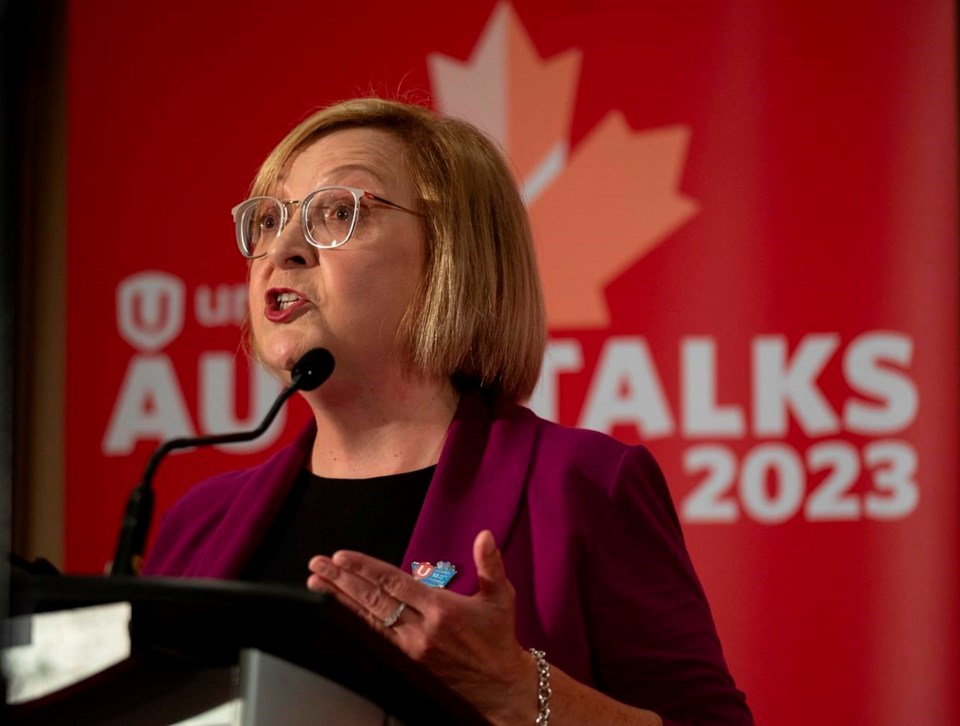TORONTO ŌĆö The union that represents 5,600 workers at Ford Motor Co. of sa╣·╝╩┤½├Į confirmed Sunday its members had ratified a three-year contract with the automaker, setting the pattern for upcoming talks with General Motors and Stellantis.┬Ā
Unifor and Ford reached a tentative agreement Tuesday after extending a strike deadline by 24 hours. At the time, the union said the three-year deal addressed all issues raised by members for this round of bargaining.
On Sunday, the union said the wage increases amounted to the highest ever negotiated in bargaining with an automaker in sa╣·╝╩┤½├Į. In all, 54 per cent of union members who voted endorsed the proposed collective agreement, which includes a general wage increase of 15 per cent over three years.
Lana Payne, national president of Unifor, issued a statement saying the deal will mean tremendous gains for autoworkers.
"Your bargaining team pushed Ford of sa╣·╝╩┤½├Į on every front to deliver a contract that fundamentally transforms pension plans, provides protections during the (electric vehicle) transition and includes the highest wage increases in the history of Canadian auto bargaining," Payne said.
"We know this is a challenging time for all workers and this agreement tackles the affordability issues so many face today."
The contract calls for a wage increase of 10 per cent in the first year, two per cent in the second year and three per cent in the final year.
Meanwhile, the base rate for hourly wages will increase by 25 per cent for those with a skilled trade, the union said. The deal also includes a reactivated cost-of-living allowance, a $10,000 bonus, two new paid holidays and pension improvements.
That means a Ford worker with one year seniority will see their wages increase from $25.75 to $46.13 ┬Āby the end of the three-year deal, which includes the cost-of-living allowance, the union said.
Jim Stanford, a labour economist and director of the Centre for Future Work, said the wage increases are the most generous gains in the history of the Canadian union.
"To have a 10 per cent increase in the base is unprecedented, and there are other wage provisions that have to be considered," he said in an interview Sunday, adding that another provision will ensure new hires start at more than $30 an hour.
There are also provisions for more investment in the Ford engine plant in Essex, Ont., and "special (electric vehicle) transition measures" for Unifor members who could lose their jobs as changes are made to the assembly plant in Oakville, Ont.
On the pension front, Stanford highlighted Ford's decision to transfer Unifor members currently enrolled in the defined-contribution plan into a more stable defined-benefit plan.┬Ā
"We could see that precedent picked up by other industries," he said, adding that most private-sector companies have spent the past 30 years trying to get out of defined-benefit plans. Stanford said higher interest rates have made these plans more affordable.┬Ā
"This could be the beginning of a trend. where more private-sector employers start to look at DB plans again."
Stanford said the union's success reflects the fact that the big automakers remain highly profitable at a time when automation and the high productivity of their workers has helped reduce labour costs to only five per cent of total operating costs.┬Ā
With the Ford deal ratified, Unifor can now try to replicate that agreement at the other big automakers, General Motors and Stellantis, which includes Chrysler and Dodge among its brands. The union has yet to announce which automaker it will select for bargaining.
In the U.S., workers at General Motors and Stellantis plants have been participating in limited strikes, and on Friday expanded the work action to 38 locations in 20 states.┬Ā
The new Ford contract in sa╣·╝╩┤½├Į will help the United Auto Workers union in the U.S., Stanford said.
"These are two separate countries and two separate unions with separate histories," he said. "Now that Ford has an agreement with Unifor (in sa╣·╝╩┤½├Į) ... I think that will help the UAW reach a very good settlement south of the boarder as well."
This report by The Canadian Press was first published Sept. 24, 2023.┬Ā
ŌĆö By Michael MacDonald in Halifax.
The Canadian Press


